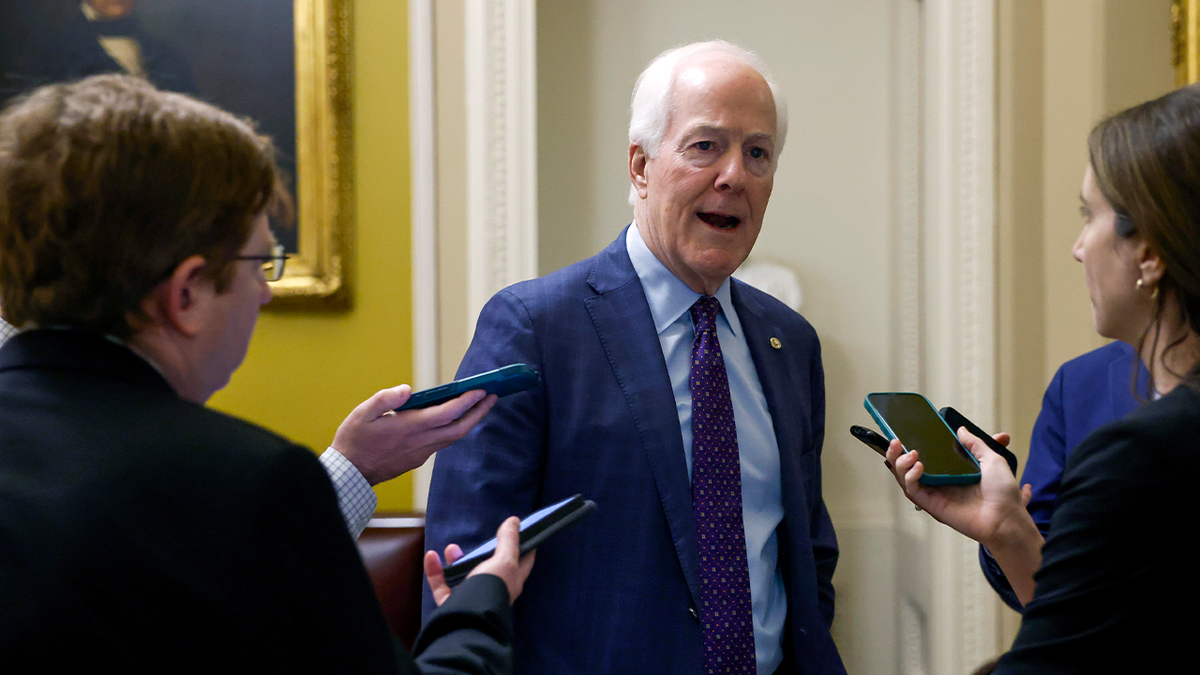Congress failed to get its act together to pass four spending bills and avoid a partial government shutdown last week.
So he's trying again this week.
But here's the catch.
Only in Congressional logic would you add two bills to the mix and give yourself one less day to finish everything.
Lawmakers must now approve six spending packages before Friday. But neither the House nor the Senate resume their sessions until Tuesday evening.
So here we go again.
HOWLESS ON POWER: AFTER CHANGES IN GOP LANDSCAPE, MCCONNELL’S LEADERSHIP IS COMING TO AN END
“Watching House Republicans is like watching a football team whose best play is punt and block,” said Rep. Matt Gaetz, R-Fla. “We've blocked (Senate Minority Leader Mitch) McConnell, R-Ky., from additional funding. But we're once again emphasizing necessary spending cuts.”
That said, bipartisan leaders in the House and Senate are full of optimism that Congress will avoid an early Saturday morning shutdown. The parties released a universal plan this weekend to consolidate funding bills for military construction/veterans, transportation/housing, agriculture, energy and water – as well as two new Bills: A measure to fund commerce, justice, and science programs, as well as the Interior.
The House is expected to advance this matter on Wednesday. The Senate Thursday or Friday – just under the wire before the 11:59:59 p.m. deadline.
These bills represent less than a third of all government funding. The biggest problem appears on March 22. This is when the rest of the expense bills come due. And the gymnastics required to pass these bills should be exponentially more difficult.
First, House Speaker Mike Johnson, R-La., has long promised that he would no longer support any spending bills. Congress has now approved four stopgap spending measures to prevent government shutdowns since the fall. Johnson presided over three. Former House Speaker Kevin McCarthy, R-Calif., pushed the first one through late last September. Simply doing that interim spending bill last fall is exactly what cost McCarthy his job.

President Mike Johnson remains steadfast in his position that border security measures are necessary in exchange for aid to Ukraine.
Yet Johnson is still there without his leadership being questioned.
It makes sense ?
Not really. But that's where we are.
Johnson found himself on the defensive a few days ago when he and other leaders called the latest punt. Some angry Republicans say they found out about the latest mulligan via Twitter or X. But Johnson called the fourth stopgap bill a “CR process.” That's short for “Continuing Resolution,” an emergency bill that simply renews all funding at current levels to avoid a shutdown. But no one had ever heard the term “CR process” before Johnson rolled it out.
Johnson said Republicans would have “72 hours to review” the tranche of six bills they welded together. It's true. But the House voted early Thursday afternoon to simply restore the old funding — even though that bill hadn't been released in three days. House Republicans typically insist they have a three-day grace period before voting on a bill. But Johnson scrapped that provision – although one could argue there wasn't much to read into it since it simply green-lighted the old funding.
But a CR is a CR is a CR.
It's still parliamentary putty.
Johnson vowed he would no longer muddle with interim bills.
Hence the new term “CR process”.
“We continued with the CRs and the same policies I voted against on September 30, the last act of the previous president,” complained Rep. Bob Good, R-Va., chairman of the House Freedom Caucus. “I described it as a failure. I think it was another terrible decision.”
Republicans say Hunter Biden deposition reveals inconsistencies in testimony
The House voted to avoid a shutdown 320-99 Thursday afternoon. But as has become de rigeur in the Republican-controlled House, far more Democrats supported the plan than GOPers. 207 Democrats voted yes. Only 113 Republicans voted yes. This represents a delta of 94 votes. Ninety-seven Republicans voted no. Only two Democrats voted no.
Johnson was prescient earlier today in putting yet another CR on the field.
“The appropriations process is ugly. Democracy is ugly,” Johnson said. “It’s been a long road to get here.”
Johnson's homily failed to do much good.
“In fact, a Democratic member said to me this morning, 'We like it when you're in charge because nothing changes, but you all get blamed,'” Good said.

(Graeme Sloan/Bloomberg via Getty Images)
But some Republicans said that was all they could do, given their slim 219-213 majority.
“The American people gave us a slim majority in the House,” said Rep. Chuck Fleischmann, R-Tenn., who chairs the Energy and Water Appropriations subcommittee. “This negotiation has been difficult. But shutting down the government at a time like this would hurt people who shouldn't be hurt.”
There were myriad reasons why Republicans might oppose the transition spending bill. There was simply the fact that it was not a new bill. Others noted that he reauthorized spending approved when former House Speaker Nancy Pelosi, Democrat of California, wielded the gavel and recognized many of his spending priorities. And then there was the southern border.
“Any continuing resolution must provide for border control,” said Rep. Ralph Norman, R-S.C. “So if you're so afraid of shutting down the government and you don't take the risk of closing the border, there's a problem.”
SEN. FETTERMAN CONDITIONALLY PASSES GOP BORDER BILL
Rep. Mike Quigley, D-Ill., joined Rep. Jake Auchincloss, D-Mass., as only two Democrats to oppose the most recent CR. Quigley says he opposes CRs until lawmakers pass a bill to help Ukraine.
“I have no other way to draw attention (to Ukraine) than to travel there,” Quigley said.
And so, over the weekend, the combined measure of six bills for this week arrived in lawmakers' inboxes. The House will consider all of these bills together at the same time. House Republicans are reluctant to pass anything called an “omnibus.” This is where congressional leaders glue together the 12 appropriations bills. Six bills could constitute a “minibus” – although some conservatives might quibble on this point.

WASHINGTON, DC – FEBRUARY 07: Senator John Cornyn (R-Texas) arrives for a luncheon with Senate Republicans at the U.S. Capitol on February 07, 2024, in Washington, DC. The Senate has failed to pass legislation addressing immigration and border security, supplemented by foreign aid to Ukraine and Israel, and is struggling to pass legislation without including the element of border and immigration with which Senate Republicans take issue. (Photo by Anna Moneymaker/Getty Images) (Anna Moneymaker/Getty Images)
Johnson continues to say the House has broken “omnibus fever.”
Just for the record, there is no clear definition in Congress of what constitutes an “omnibus” bill or a “minibus” bill. However, it is generally accepted that the 12 bills grouped together constitute an “omnibus”. Anything less is probably a “minibus”.
Yet Rep. Thomas Massie, R-Ky., saw the punt coming last week. He expected congressional leaders to reject the bill as a massive bill.
“It's the old way of doing business, where executives hide behind closed doors, disappear for a few weeks with something and say 'take it or leave it,'” Massie said. “There is no amendment. There is no change. And I think we have to reject that notion.”
CLICK HERE TO GET THE FOX NEWS APP
What we haven't mentioned yet is the SECOND tranche of the remaining six spending bills, due March 22. These include more delicate and controversial policy areas. Defense. Internal security. And Work/Health and Social Services. These last two can be particularly tricky. This is because the border is a major issue. The same goes for abortion and the recent Alabama Supreme Court decision on IVF and embryos.
Congress could finally pass bills to fund the government this week. But the biggest test looms later this month. And all bets could be off for Johnson — and for the chances of a government shutdown — if lawmakers stumble with the next round of funding.
